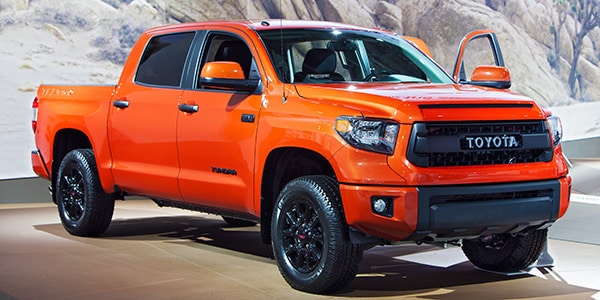One of the first things people tell you when you purchase a new car is that it immediately loses value as soon as you drive it off the lot. But this is truer for some vehicles than for others.
Plenty of cars on the market hold their value well, meaning you can get a great return on your investment if you decide to sell or trade it in down the line. So don’t give up on that new car dream or auto financing search just yet.
5 Best Cars That Hold Their Value
We’ve examined results from a study published by iSeeCars, an online automotive search engine and research website, to find the cars that last financially. The study examined five-year car depreciation across all segments and found that these are the five best cars that hold their value.
Lowest depreciation overall: Jeep Wrangler and Jeep Wrangler Unlimited
The Jeep Wrangler, with an average of 9.2% depreciation after five years and an average dollar difference from its MSRP of $2,796, is the vehicle with the lowest depreciation overall. And the Jeep Wrangler Unlimited came in second, trailing with a 10.5% depreciation and a $3,810 difference from its original MSRP.
This makes them not only the best-rated options in their respective categories — small and midsize SUVs — but also the best vehicles when it comes to depreciation among all vehicles. But what helps these Jeeps keep their value?

Jeep is an American icon with a cult following, plus, the body style hasn’t changed very much over many years. Wranglers also have a reputation for being durable, dependable and just plain fun to drive. Because of the great combo of notoriety, consistent style and utility, they remain incredibly popular, which helps keep their resale value high.
As a result, Jeep Wranglers and Wrangler Unlimiteds don’t depreciate as quickly as other vehicles on the market. If you’re looking for the best vehicle to hold its value over time and be a great candidate for auto refinancing down the road, a Jeep Wrangler and Jeep Wrangler Unlimited should both be at the top of your list.
Best in sports cars: Porsche 911
With an average depreciation of 12.8% during its first five years, owners will see a difference of $20,710 from its original MSRP. Although this number might seem high, we must remember that the 911 is a luxury vehicle with a high starting price. In fact, it’s the most expensive car on our list.
Porsche’s 911 is a classic sports car that has been around for decades. It’s beloved by both driving enthusiasts and luxury car buyers for its style, performance and reputation. These factors help to keep the 911’s resale value high, despite its high starting price.
Best in midsize pickups: Toyota Tacoma
The Toyota Tacoma, with a 13.8% depreciation, is the best in midsize pickups.
The Toyota Tacoma is one of the best-selling midsize pickup trucks in America, and it’s no surprise that it also holds its value better than any other truck in its class.
The Tacoma has a reputation for being steadfast and trustworthy, which helps to keep its resale value high. It’s also popular with consumers and businesses, which further helps keep its value up.
Best in full-size pickup trucks: Toyota Tundra
The Toyota Tundra squeaks in at under 20% depreciation with an estimated 19.5% drop in value.
The Toyota Tundra is a full-size pickup truck that’s been on the market since 1999 and earned Motor Trend’s truck of the year in both 2000 and 2008. Its reputation for long-term dependability and low maintenance costs helps to keep its resale value high.
And just like its smaller sibling, the Tacoma, the Tundra is also popular with both regular private owners and businesses, which further helps to keep its value up.

Vehicles That Depreciate Heavily
Although some cars hold their value well, others depreciate quite a bit over time. Here are some of the vehicle categories that declined the most in value over their first five years, and examples of models from each.
Electric vehicles – EVs tend to lose value more rapidly than traditional gas-powered cars. This is partly due to technology constantly evolving, and newer EV models are often much more efficient than older ones.
For example, the Nissan LEAF suffers a 65.5% depreciation of its value over five years, making it the worst vehicle in terms of value retention. But even the best in its category, the Tesla Model X, is hit by a 46.9% loss in value.
It’s also notable that the BMW i3, another EV, occupies the second spot on our list of vehicles that lose the most value, with 63.1%.
Luxury sedans and SUVs – These depreciate quickly because consumers tend to purchase them new, and they’re used for only a few years before being replaced by a newer model. As a result, luxury vehicles in these categories can be difficult to sell used, and their resale values can be pretty low.
Luxury sedans and SUVs make up eight of the 10 worst vehicles in terms of value retention. The BMW 7 Series leads the way with a 61.5% depreciation, followed by the Maserati Ghibli at 61.3% and BMW X5 at 60.3%.
With these vehicles being more expensive than most others on the list, their high depreciation rates result in some of the most significant dollar-amount losses in value. For example, the BMW 7 Series at full depreciation estimate comes to an average of $63,271 difference from MSRP.
Avoiding Costly Depreciation
When it comes to vehicle value retention, not all cars are created equal. Some vehicles, like the Jeep Wrangler models, Porsche 911 and Toyota Tacoma, hold their value quite well, and others — like electric vehicles and luxury sedans/SUVs — lose value more rapidly.
Understanding which cars hold their value and which don’t can help you make a more informed decision when purchasing a new vehicle. And if you’re looking to sell your car down the road, knowing its estimated resale value can help you get the most money back for your investment.



